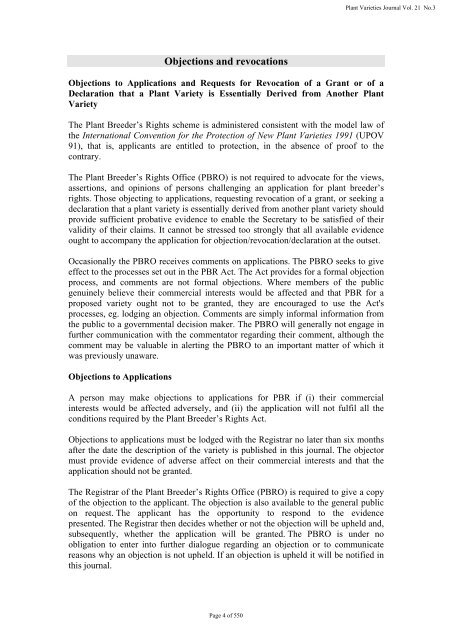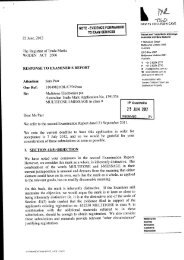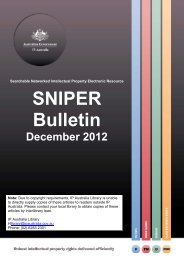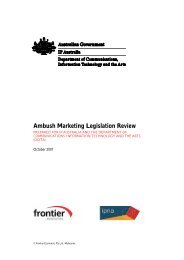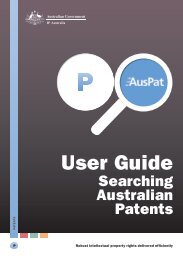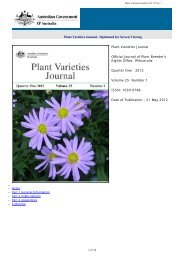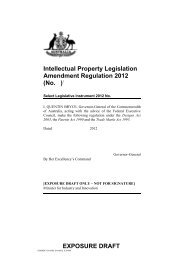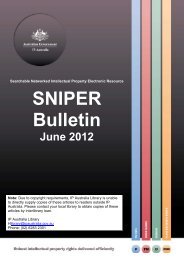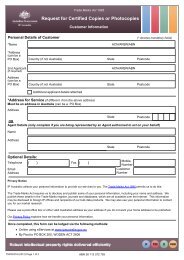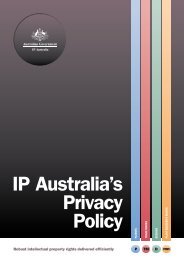- Page 1 and 2: ● Plant Breeders Rights ● Home
- Page 3: Interactive Variety Description Sys
- Page 7 and 8: Overseas Testing/Data Use of Overse
- Page 9 and 10: PBR Infringement Grantees should be
- Page 11 and 12: Cumulative Index to Plant Varieties
- Page 13 and 14: Requirement to Supply Comparative V
- Page 15 and 16: European Developments Community pla
- Page 17 and 18: Instructions to Qualified Persons I
- Page 19 and 20: The Queensland office Monday 4 May
- Page 21 and 22: ACCEPTANCE The following varieties
- Page 23 and 24: ‘Bonmadpipa’ syn Pink Single Ap
- Page 25 and 26: ‘BundyGem’ Application No: 2008
- Page 27 and 28: Erodium chrysanthum CRANESBILL, YEL
- Page 29 and 30: ‘Caramel’ Application No: 2008/
- Page 31 and 32: ‘MULTIRED 3’ Application No: 20
- Page 33 and 34: ‘TPP5’ Application No: 2008/071
- Page 35 and 36: ‘PRERASJER’ Application No: 200
- Page 37 and 38: Applicant: The Western Australian A
- Page 39 and 40: Poinsettia (Euphorbia pulcherrima)
- Page 41 and 42: Lentil (Lens culinaris) Leucadendro
- Page 43 and 44: Nectarine (Prunus persica var. nuci
- Page 45 and 46: Wheat (Triticum aestivum) Wheat (Tr
- Page 47 and 48: Plant Varieties Journal Plant Varie
- Page 49 and 50: Plant Varieties Journal Plant Varie
- Page 51 and 52: Plant Varieties Journal Plant Varie
- Page 53 and 54: Plant Varieties Journal Plant Varie
- Page 55 and 56:
Plant Varieties Journal Plant Varie
- Page 57 and 58:
Page 57 of 550 Plant Varieties Jour
- Page 59 and 60:
Plant Varieties Journal Plant Varie
- Page 61 and 62:
Plant Varieties Journal Plant Varie
- Page 63 and 64:
Plant Varieties Journal Plant Varie
- Page 65 and 66:
Plant Varieties Journal Plant Varie
- Page 67 and 68:
Plant Varieties Journal Plant Varie
- Page 69 and 70:
Plant Varieties Journal Plant Varie
- Page 71 and 72:
Plant Varieties Journal Plant Varie
- Page 73 and 74:
Plant Varieties Journal Plant Varie
- Page 75 and 76:
Plant Varieties Journal Plant Varie
- Page 77 and 78:
Plant Varieties Journal Plant Varie
- Page 79 and 80:
Plant Varieties Journal Plant Varie
- Page 81 and 82:
Plant Varieties Journal Plant Varie
- Page 83 and 84:
Plant Varieties Journal Plant Varie
- Page 85 and 86:
Page 85 of 550 Plant Varieties Jour
- Page 87 and 88:
Page 87 of 550 Plant Varieties Jour
- Page 89 and 90:
Page 89 of 550 Plant Varieties Jour
- Page 91 and 92:
Page 91 of 550 Plant Varieties Jour
- Page 93 and 94:
Page 93 of 550 Plant Varieties Jour
- Page 95 and 96:
Page 95 of 550 Plant Varieties Jour
- Page 97 and 98:
Plant Varieties Journal Plant Varie
- Page 99 and 100:
Page 99 of 550 Plant Varieties Jour
- Page 101 and 102:
Page 101 of 550 Plant Varieties Jou
- Page 103 and 104:
Page 103 of 550 Plant Varieties Jou
- Page 105 and 106:
Page 105 of 550 Plant Varieties Jou
- Page 107 and 108:
Page 107 of 550 Plant Varieties Jou
- Page 109 and 110:
Page 109 of 550 Plant Varieties Jou
- Page 111 and 112:
Page 111 of 550 Plant Varieties Jou
- Page 113 and 114:
Plant Varieties Journal Plant Varie
- Page 115 and 116:
Plant Varieties Journal Plant Varie
- Page 117 and 118:
Plant Varieties Journal Plant Varie
- Page 119 and 120:
Plant Varieties Journal Plant Varie
- Page 121 and 122:
Plant Varieties Journal Plant Varie
- Page 123 and 124:
Plant Varieties Journal Plant Varie
- Page 125 and 126:
Plant Varieties Journal Plant Varie
- Page 127 and 128:
Plant Varieties Journal Plant Varie
- Page 129 and 130:
Plant Varieties Journal Plant Varie
- Page 131 and 132:
Plant Varieties Journal Plant Varie
- Page 133 and 134:
Plant Varieties Journal Plant Varie
- Page 135 and 136:
Plant Varieties Journal Plant Varie
- Page 137 and 138:
Plant Varieties Journal Plant Varie
- Page 139 and 140:
Plant Varieties Journal Plant Varie
- Page 141 and 142:
Plant Varieties Journal Plant Varie
- Page 143 and 144:
Plant Varieties Journal Plant Varie
- Page 145 and 146:
Plant Varieties Journal Plant Varie
- Page 147 and 148:
Plant Varieties Journal Plant Varie
- Page 149 and 150:
Page 149 of 550 Plant Varieties Jou
- Page 151 and 152:
Page 151 of 550 Plant Varieties Jou
- Page 153 and 154:
Page 153 of 550 Plant Varieties Jou
- Page 155 and 156:
Page 155 of 550 Plant Varieties Jou
- Page 157 and 158:
Plant Varieties Journal Plant Varie
- Page 159 and 160:
Details of Application Application
- Page 161 and 162:
Ear: length medium medium medium me
- Page 163 and 164:
Details of Application Application
- Page 165 and 166:
*Spathe: colour of throat spot purp
- Page 167 and 168:
Variety Description and Distinctnes
- Page 169 and 170:
Details of Application Application
- Page 171 and 172:
Degree of: fading of flower colour
- Page 173 and 174:
Varieties of Common Knowledge ident
- Page 175 and 176:
Details of Application Application
- Page 177 and 178:
Mean 13.00 14.90 15.20 Std. Deviati
- Page 179 and 180:
grown. Selection was made for vigou
- Page 181 and 182:
LSD/sig 1.97 P≤0.01 P≤0.01 ns S
- Page 183 and 184:
Choice of Comparators Characteristi
- Page 185 and 186:
Leaf: presence of nectaries present
- Page 187 and 188:
Details of Application Application
- Page 189 and 190:
Bract: size medium medium Boll: siz
- Page 191 and 192:
Most Similar Varieties of Common Kn
- Page 193 and 194:
Fibre: length uniformity (%) Mean 8
- Page 195 and 196:
Most Similar Varieties of Common Kn
- Page 197 and 198:
Boll: lint proportion (%) Mean 45.5
- Page 199 and 200:
RHS Chart - edition 2001 edition. O
- Page 201 and 202:
Statistical Table Organ/Plant Part:
- Page 203 and 204:
Details of Application Application
- Page 205 and 206:
Petal: apex rounded pointed rounded
- Page 207 and 208:
Varieties of Common Knowledge ident
- Page 209 and 210:
Details of Application Application
- Page 211 and 212:
Variety Description and Distinctnes
- Page 213 and 214:
Details of Application Application
- Page 215 and 216:
Standard petal: colour of markings
- Page 217 and 218:
Variety Description and Distinctnes
- Page 219 and 220:
Most Similar Varieties of Common Kn
- Page 221 and 222:
*Adult leaf: size of blade *Mature
- Page 223 and 224:
Prior Applications and Sales Countr
- Page 225 and 226:
Varieties of Common Knowledge ident
- Page 227 and 228:
achis inflorescence peduncle Flower
- Page 229 and 230:
Choice of Comparators Characteristi
- Page 231 and 232:
Details of Application Application
- Page 233 and 234:
*Leaf: anthocyanin colouration abse
- Page 235 and 236:
Details of Application Application
- Page 237 and 238:
Plant: height (flowering plant incl
- Page 239 and 240:
Details of Application Application
- Page 241 and 242:
*Leaf blade: angle of the tip point
- Page 243 and 244:
Details of Application Application
- Page 245 and 246:
*Leaf blade: angle of the tip point
- Page 247 and 248:
Details of Application Application
- Page 249 and 250:
*Spike: maximum width medium to bro
- Page 251 and 252:
Most Similar Varieties of Common Kn
- Page 253 and 254:
Details of Application Application
- Page 255 and 256:
*Flower: colour of standard blue bl
- Page 257 and 258:
Organ/Plant Part: Context ‘Wildfi
- Page 259 and 260:
*Male floret mass: colour of distal
- Page 261 and 262:
Details of Application Application
- Page 263 and 264:
*Flower: main colour of inner side
- Page 265 and 266:
Details of Application Application
- Page 267 and 268:
Leaf: thickness (mm) Mean 0.81 0.59
- Page 269 and 270:
Variety Description and Distinctnes
- Page 271 and 272:
Variety Description and Distinctnes
- Page 273 and 274:
Choice of Comparators Characteristi
- Page 275 and 276:
Details of Application Application
- Page 277 and 278:
length/width ratio Fully developed
- Page 279 and 280:
Mature fruit: groove in left should
- Page 281 and 282:
DNA/molecular marker: LMMA1/202 DNA
- Page 283 and 284:
LSD/Sig. 104.8 P≤0.01 ns Ripe fru
- Page 285 and 286:
Choice of Comparators Characteristi
- Page 287 and 288:
and branches Inflorescence: density
- Page 289 and 290:
ackground colour Mature fruit/skin:
- Page 291 and 292:
Choice of Comparators Characteristi
- Page 293 and 294:
*Mature fruit: presence of sinus *M
- Page 295 and 296:
DNA/molecular marker: LMMA12/204 DN
- Page 297 and 298:
Details of Application Application
- Page 299 and 300:
*Fruit: anthocyanin colouration aro
- Page 301 and 302:
Variety Description and Distinctnes
- Page 303 and 304:
Details of Application Application
- Page 305 and 306:
*Corolla: predominant colour medium
- Page 307 and 308:
Details of Application Application
- Page 309 and 310:
etween veins (varieties with red lo
- Page 311 and 312:
Most Similar Varieties of Common Kn
- Page 313 and 314:
Details of Application Application
- Page 315 and 316:
Statistical Table Organ/Plant Part:
- Page 317 and 318:
Variety Description and Distinctnes
- Page 319 and 320:
Details of Application Application
- Page 321 and 322:
Fruit: thickness of skin medium med
- Page 323 and 324:
Variety Description and Distinctnes
- Page 325 and 326:
Details of Application Application
- Page 327 and 328:
*Fruit: anthocyanin colouration aro
- Page 329 and 330:
Fruit ground colour of flesh whitis
- Page 331 and 332:
*Fruit: pubescence present present
- Page 333 and 334:
Most Similar Varieties of Common Kn
- Page 335 and 336:
*Fruit: anthocyanin colouration aro
- Page 337 and 338:
Most Similar Varieties of Common Kn
- Page 339 and 340:
Std. Deviation 0.92 0.95 LSD/sig 1.
- Page 341 and 342:
Variety Description and Distinctnes
- Page 343 and 344:
Details of Application Application
- Page 345 and 346:
Bract: curving absent absent Bract:
- Page 347 and 348:
Variety Description and Distinctnes
- Page 349 and 350:
Details of Application Application
- Page 351 and 352:
Inflorescence: size small medium In
- Page 353 and 354:
Variety Description and Distinctnes
- Page 355 and 356:
Details of Application Application
- Page 357 and 358:
Flower bud: anthocyanin colouration
- Page 359 and 360:
‘Remarka’ Variety Description a
- Page 361 and 362:
Details of Application Application
- Page 363 and 364:
weak Leaflet: depth of veins shallo
- Page 365 and 366:
Details of Application Application
- Page 367 and 368:
of coalescence Leaflet: waviness of
- Page 369 and 370:
Details of Application Application
- Page 371 and 372:
Leaf: anthocyanin colouration on mi
- Page 373 and 374:
Details of Application Application
- Page 375 and 376:
Leaf: openness Leaf: presence of se
- Page 377 and 378:
Details of Application Application
- Page 379 and 380:
Terminal and lateral leaflets: freq
- Page 381 and 382:
Details of Application Application
- Page 383 and 384:
*Plant: frequency of flowers low lo
- Page 385 and 386:
Details of Application Application
- Page 387 and 388:
*Plant: frequency of flowers low lo
- Page 389 and 390:
Choice of Comparators Characteristi
- Page 391 and 392:
inflorescence colouration brownish
- Page 393 and 394:
Choice of Comparators Characteristi
- Page 395 and 396:
Inflorescence: tepal blade colour (
- Page 397 and 398:
Details of Application Application
- Page 399 and 400:
Stem: intensity of basal branching
- Page 401 and 402:
Details of Application Application
- Page 403 and 404:
Flower: size medium small *Fruit: l
- Page 405 and 406:
Choice of Comparators Characteristi
- Page 407 and 408:
Statistical Table Organ/Plant Part:
- Page 409 and 410:
Choice of Comparators Characteristi
- Page 411 and 412:
Statistical Table Organ/Plant Part:
- Page 413 and 414:
Most Similar Varieties of Common Kn
- Page 415 and 416:
Details of Application Application
- Page 417 and 418:
section *Flower: type double *Flowe
- Page 419 and 420:
Details of Application Application
- Page 421 and 422:
Flower: profile of upper part *Flow
- Page 423 and 424:
Most Similar Varieties of Common Kn
- Page 425 and 426:
Details of Application Application
- Page 427 and 428:
Flower bud: shape of longitudinal s
- Page 429 and 430:
Details of Application Application
- Page 431 and 432:
Flowering shoot: number of flowers
- Page 433 and 434:
Details of Application Application
- Page 435 and 436:
*Flower: profile of lower part conc
- Page 437 and 438:
Most Similar Varieties of Common Kn
- Page 439 and 440:
Details of Application Application
- Page 441 and 442:
Variety Description and Distinctnes
- Page 443 and 444:
Details of Application Application
- Page 445 and 446:
Petiole: attitude of hairs strongly
- Page 447 and 448:
Details of Application Application
- Page 449 and 450:
*Leaf: blistering medium weak weak
- Page 451 and 452:
Details of Application Application
- Page 453 and 454:
Terminal leaflet: shape of incision
- Page 455 and 456:
Details of Application Application
- Page 457 and 458:
*Fruit: ratio of length/width sligh
- Page 459 and 460:
Choice of Comparators Characteristi
- Page 461 and 462:
Details of Application Application
- Page 463 and 464:
*Fruit: predominant shape conical a
- Page 465 and 466:
per variety per block. Measurements
- Page 467 and 468:
Variety Description and Distinctnes
- Page 469 and 470:
*Mature leaf: anthocyanin colourati
- Page 471 and 472:
Plant Varieties Journal Vol. 21 No.
- Page 473 and 474:
Plant Varieties Journal Vol. 21 No.
- Page 475 and 476:
erect hairs on internodes Shoot: nu
- Page 477 and 478:
Mean 0.89 0.96 1.15 0.89 0.95 0.95
- Page 479 and 480:
laid out as a randomised block desi
- Page 481 and 482:
for fruit production only) *Young s
- Page 483 and 484:
colouration of main veins on upper
- Page 485 and 486:
Details of Application Application
- Page 487 and 488:
Characteristics Additional to the D
- Page 489 and 490:
Variety Description and Distinctnes
- Page 491 and 492:
Details of Application Application
- Page 493 and 494:
Stripe rust gene Yr18: present/abse
- Page 495 and 496:
Most Similar Varieties of Common Kn
- Page 497 and 498:
GRANTS Agapanthus africanus AGAPANT
- Page 499 and 500:
Certificate No: 3571 Expiry Date: 1
- Page 501 and 502:
Agent: Australian Nurseryman's Frui
- Page 503 and 504:
‘EGA Burke’ A Application No: 2
- Page 505 and 506:
Denomination Changed Common Changed
- Page 507 and 508:
Change of Agent Plant Varieties Jou
- Page 509 and 510:
Withdrawn Plant Varieties Journal V
- Page 511 and 512:
2002/080 Plectranthus strigosus sac
- Page 513 and 514:
Corrigenda Cordyline australis ‘J
- Page 515 and 516:
APPENDIX 1 FEES Two fee structures
- Page 517 and 518:
APPENDIX 2 Plant Breeders Rights Ad
- Page 519 and 520:
Anigozanthos Paananen, Ian Kirby, G
- Page 521 and 522:
Cereals Bullen, Kenneth Collins, Da
- Page 523 and 524:
___________________________________
- Page 525 and 526:
Lucerne Bannan, Nathaniel Downes, R
- Page 527 and 528:
Ornamentals - Indigenous Abell, Pet
- Page 529 and 530:
Pistacia Richardson, Clive Sykes, S
- Page 531 and 532:
___________________________________
- Page 533 and 534:
TABLE 2 Plant Varieties Journal Vol
- Page 535 and 536:
Plant Varieties Journal Vol. 21 No.
- Page 537 and 538:
Paananen, Ian 02 4381 0051 02 8569
- Page 539 and 540:
Appendix 4 Index of Accredited Non-
- Page 541 and 542:
APPENDIX 5 ADDRESSES OF UPOV AND ME
- Page 543 and 544:
analysed data. These staff will req
- Page 545 and 546:
Luff Partnership Kulnura, NSW Ramm
- Page 547 and 548:
APPENDIX 7 List of Classes for Vari
- Page 549 and 550:
APPENDIX 8 REGISTER OF PLANT VARIET


